Sports

“To me being Christian means f---ing s--- up,” Layshia Clarendon told ESPN’s Katie Barnes. “That’s what Jesus came to do. It means disrupting and fighting for the most marginalized people.” During the 2020 WNBA season, they helped lead players in protesting police violence against Breonna Taylor and other Black women. Clarendon helped launch the WNBA’s Social Justice Council, alongside players like Sydney Colson, Breanna Stewart, Tierra Ruffin-Pratt, A’ja Wilson, and Satou Sabally. Clarendon signed on to the Athletes for Ceasefire in Gaza, and they launched a foundation to provide grants that help transgender people access health care and other services.
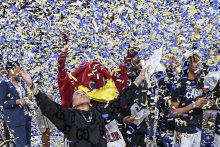
After the South Carolina Gamecocks women’s basketball team won the NCAAW championship on April 7, 2024, the team’s deeply emotional head coach Dawn Staley attributed the historic win to God: “We serve an unbelievable God — we serve an unbelievable God.” Staley continued, “Uncommon favor, unbelievable.”
What does “uncommon favor” mean exactly? Typically, that phrase has been used in church spaces to denote an unexpected blessing. In Staley’s case, we find her crediting God for blessing her and the Gamecocks with a national championship.
Is this uncommon favor?

Only 1 in 4 adults play sports each year, according to a 2015 study from NPR, the Robert Wood Johnson Foundation, and Harvard University’s T.H. Chan School of Public Health. This is despite nearly three in four respondents reporting playing as kids, and a majority of adults saying sports improved their mental and physical health ... Ashley Lynn Hengst sees opportunities for the church to help decrease those disparities and build space for more people of all ages to play sports. Hengst serves in pastoral care at All Saints Church in Pasadena, Calif., after a decade working for the Y in youth development.
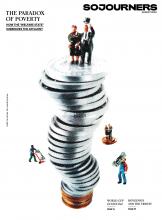
How the “welfare state” is designed to subsidize affluence rather than fight poverty.
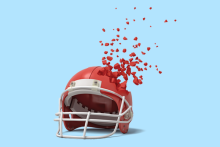
EARLY IN THE 2022 NFL season, I watched as the Miami Dolphins quarterback Tua Tagovailoa suffered a second head injury in the span of five days. Although the NFL would not admit the first of those was a concussion, it was painfully clear that Tagovailoa suffered serious brain trauma.
In that moment, I felt the culmination of years’ worth of fretting over the sport I loved and its relationship to head injuries. I determined then and there on a Thursday night that I would quit the NFL. Why? The NFL is violent — and Christians are called to peace.
The league is unrepentant and unaccountable in its abuse of the brains and bodies of its players, and no amount of reform can change that. I am convicted that if I am to love my neighbors — if I am to love God — then I must resist the NFL.
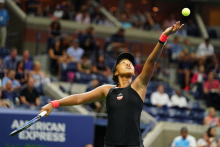
I am no stranger to the ways that sports is often derided in faith and justice circles. But I contend that sports and competition offer valuable insights into what it means to be human.

In the essay “How The Idea Of Hell Has Shaped The Way We Think,” published in the Jan. 21 edition of the New Yorker, writer Vinson Cunningham examines The Penguin Book of Hell and launches into a stunning and far-ranging reflection on how the doctrine of hell relates to our concerns about the here and now. As a staff writer for the New Yorker since 2016, Cunningham has written on a variety of subjects including Pope Francis, theater, and the NBA. Prior to this, he was a columnist at McSweeney’s and served as a staff assistant at the Obama White House.
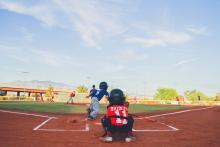
Although there are terrible examples of abusive coaches, most coaches instill their players with respect for rules, officials, and the opponent, encouraging selfless teamwork and giving more playing time to those working harder in practice. Studies show that athletic performance improves when athletes perceive coaches to be fair. And this formative influence can last for decades: NBA legend Kareem Abdul-Jabbar credits his former college coach, John Wooden, for providing the guidance that led Abdul-Jabbar to become a successful basketball player and lifelong justice advocate. “Coach Wooden taught me a lot about basketball through his words,” writes Abdul-Jabbar. “But more important, his example as a man of unbending moral strength taught me how to be the man I wanted to be—and needed to be.”

Editors’ note: This article appeared in Sojourners magazine in 2018. In 2020, a Washington Post article by Will Hobson raised concerns about some of Bennet Omalu’s conclusions on chronic traumatic encephalopathy (CTE). Ongoing research suggests that CTE is a risk for NFL players, but the rate and severity of the brain disease among football players is still being studied.
DR. BENNET OMALU is well-acquainted with gruesome deaths. “Some people wake up in the morning, put on their suits, go to offices, and to do things associated with life, with living. But me,” Omalu says from behind the office desk in his Sacramento-area home, “I dress up, I go to work to do things associated with the greatest weaknesses of [humanity].”
A forensic pathologist and neuropathologist who earned degrees in his native Nigeria and in various schools across the U.S., Omalu was most recently in the news for performing an independent autopsy on Stephon Clark, an unarmed black man killed in his own backyard. Omalu’s work confirmed that Clark was shot in the back six times by Sacramento police.
Omalu is best known, however, for the startling discovery he made after performing an autopsy on former NFL player Mike Webster. As chronicled in the 2015 film Concussion, with Will Smith starring as Omalu, the then-medical examiner in Pittsburgh found Webster had chronic traumatic encephalopathy, a degenerative brain disease caused by repeated blows to the head—the kind of blows to the head you ought to expect when playing tackle football.
But despite his daily proximity to death, Omalu, a committed Catholic, has nothing but gratitude. “I am blessed because I encounter death every day ... I came to the world naked, cold, and lonely, and I will leave the world alone, cold, and lonely,” he explains. “When you realize that, you begin to think of powers, realities, dimensions that are beyond you.”
Omalu is precise and careful with his words. When he says, “I let the Spirit of God percolate into my being,” I half expect to hear his celestial brew bubble. “Everything I do, I do through the eyes of faith.”
Omalu doesn’t seem to be exaggerating; his Christian beliefs and morals permeate his outlook on everything. Early in our conversation, he asks if I’m a Christian writer, and I try to say I’m more like a Christian who writes, but Omalu isn’t one to thread the needle between competing postmodern definitions of Christian vocation. The Bible on his desk is as important to him as any medical textbook—and based on its proximity to his laptop, he might use the Bible more often.
And it’s with this same precision that Omalu offers an uncompromising assessment of the sport running U.S. recreational life each Saturday and Sunday (plus Monday nights on ESPN, Fridays if you’re in high school, and it’s even trying to make Thursdays a thing) for about six months out of the year.

I GREW UP dazzled by NBA champion Kobe Bryant taking over games and redefining precision—I could never look away when he was on the court. But the sexual assault accusations brought against him in 2003 are as much a part of Bryant’s legacy as the night he dropped 81 points on the Toronto Raptors.
Domestic violence and sexual assault cast a long shadow over athletics, as much in Christian colleges as in secular universities or professional sports. Christian colleges should be held to a higher standard, however, because they have a gospel mission to shape disciples and protect the vulnerable, not just trade in talent.
That’s why I was dismayed in November when Liberty University (“Training Champions for Christ since 1971”) hired Ian McCaw as its new athletic director. McCaw resigned from Baylor University last year after he was sanctioned and placed on probation for his role in a widespread sexual assault scandal. The investigation into McCaw’s negligence led an independent law firm to release “scathing findings” of an “overall perception that football was above the rules,” and a complete lack of a “culture of accountability for misconduct.”
Liberty President Jerry Falwell Jr.’s response? McCaw’s tenure at Baylor “fits perfectly with where we see our sports programs going.”
Professional sports are notorious for an institutional failure to hold sports figures accountable and to believe, respect, and protect victims of physical and sexual violence by those same figures. The NFL famously prioritizes player talent over women’s safety and imposes punishment to offenders unevenly—an inconsistency that often has a racialized narrative.
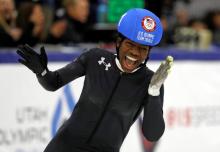
U.S. speedskater Maame Biney, just-turned 18, has a smile that can light up any room, a giggle that has charmed Olympic audiences and a joy that her coaches say has carried her so far in her athletic career at such a young age.
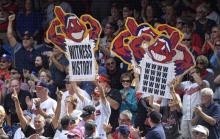
“Over the past year, we encouraged dialogue with the Indians organization about the club’s use of the Chief Wahoo logo. During our constructive conversations, Paul Dolan made clear that there are fans who have a longstanding attachment to the logo and its place in the history of the team."

Local sports teams can serve as a training ground for young leaders. Kaepernick, and others who have knelt, are not merely using their platform for a political message — they are trying to tell us something about who they are and what they’ve gone through to get there.
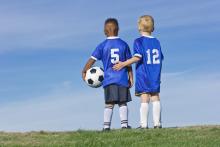
DAVID KING and Margot Starbuck are nostalgic for the good ol’ days of youth sports. In Overplayed: A Parent’s Guide to Sanity in the World of Youth Sports, the authors first critique the current youth sports machine by reminiscing about an athletic utopia of the past: One where kids used water bottles for goal posts and flip-flops for bases. Back when parents weren’t paying up to $18,000 in hotel and trainer fees for elite travel teams. Back when kids loved sports.
This book intends to teach parents how to prevent burnout, overuse injury, and a misguided value system for their children. However, I read Overplayed as a young single woman learning to love sports again after suffering overuse injury and burnout right before college. I wish my parents—loving and good-intentioned as they were and are—had read this book 20 years ago.
King, athletic director at a Mennonite university, and Starbuck, a writer and a parent to three teenage athletes, believe that sports has the potential to be a powerful force in the lives of children. However, often money and myths corrupt that potential. Early on, Starbuck speaks wonders of the ways athletics teach us to know and love our physicality, explaining, “I came to know my body as good because of the opportunities I had to play sports as a girl.” But with early single-sport specialization and year-round tournament schedules, children are coming to know their bodies as injured before they can come to know their bodies as good. The authors note that in 2014, 1.35 million kids suffered sports-related injuries that landed them in the emergency room. “‘No pain no gain,’” the authors insist, “should have no place in youth sports.”
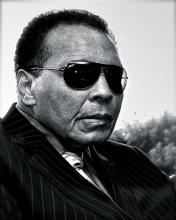
Muhammad Ali aimed a powerful and impassioned message at Republican presidential candidate Donald Trump on Dec. 9, saying that the recent global terrorism crisis has “perverted people’s views on what Islam really is.”
Ali became a Muslim and changed his name from Cassius Clay during the height of his career as one of the greatest boxers in history. His message came in a statement following a week in which Trump cast doubt on President Barack Obama’s assertion that several American “sporting heroes” practiced Islam.
“I am a Muslim, and there is nothing Islamic about killing innocent people in Paris, San Bernardino, or anywhere else in the world,” Ali said.
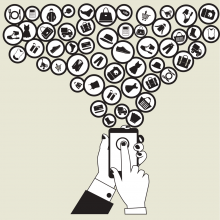
For Christians, it’s sometimes hard to admit believing in the supernatural, the legitimacy of miracles, an afterlife, and following an ancient text written thousands of years ago by numerous authors that have been divinely inspired by an all-knowing, all-powerful, and omnipresent God.
At first glance, Christianity seems at odds with an increasingly “secular” culture that views spirituality as old-fashioned and irrelevant, but our society reveals that everything — and everyone — is spiritual on some level.
At first glance, Christianity seems at odds with an increasingly “secular” culture that views spirituality as old-fashioned and irrelevant, but our society reveals that everything — and everyone — is spiritual on some level.
1. The Religion of Sport
Few people pray more fervently, earnestly, and passionately than when their favorite sports teams — and athletes — are competing.
With arms outstretched, they wildly clap, cheer, chant, cry, and scream at the top of their lungs. Wearing costumes, jerseys, and following
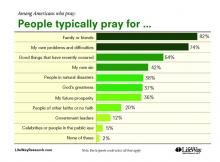
When Americans aren’t busy praying for themselves or their own needs — and most of them are — many are seeking divine intervention on behalf of a favorite sports team or the golden ticket in the lottery, according to a new survey.
About 13 percent of Americans who pray say they pray for sports teams, compared with about one in five (21 percent) who say they have prayed to win the lottery, the new survey from LifeWay Research suggests.
A survey earlier this year from Public Religion Research Institute suggested that more Americans (26 percent) pray for their sports team, while more than seven in 10 (73 percent) say they have never done this.
Some of LifeWay’s new survey’s main findings include:

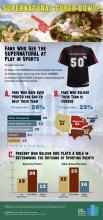
Most Americans don’t think God or the devil will be picking the NFL playoff winners this weekend or any other sports champions.
But some will pray nonetheless, and a few will “religiously” perform little game-day rituals just in case.
A survey by Public Religion Research Institute, released Thursday, probes the crossover between team spirit and spirituality.
Most Americans (60 percent) call themselves fans of a particular team. Among this group, several will do a little dance or say a little prayer to help the team along:
- 21 percent (including one in four football fans) will wear special clothes or do special rituals. Donning a team jersey leads the way (66 percent). But some admit they get a little funky with their underwear. One fan wears dirty undershorts on top of his jeans. (No word if these are boxers or briefs.)
- 25 percent (including 31 percent of football fans) have sometimes felt their team has been cursed. (No word on how many are Red Sox fans.)
- 26 percent (including one in three football fans) say they pray to God to help their team. White evangelicals are most likely to lean on the Lord on this: 38 percent will pray, more than any other religious group.
- Football fans are also more likely than other fans to admit praying for their team (33 percent to 21 percent), performing pre-game or game-time rituals (25 percent to 18 percent), or to believe that their team has been cursed (31 percent to 18 percent).

The Archdiocese of St. Louis is putting an end to alcohol sales at youth-related events.
Under a new policy that goes into effect Friday, drinking will not be allowed at any event that is directed primarily toward minors.
That means parents will no longer be allowed to throw back a few beers during their kids’ soccer, volleyball, and softball games. And athletic associations will no longer rake in revenue from beer sales at their concession stands.